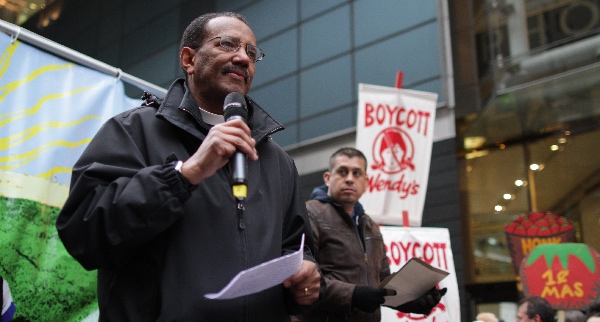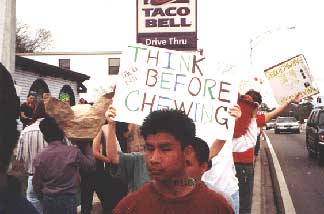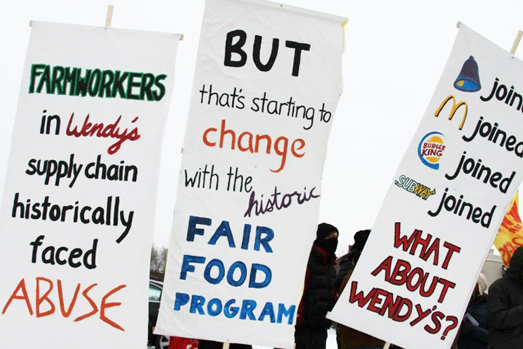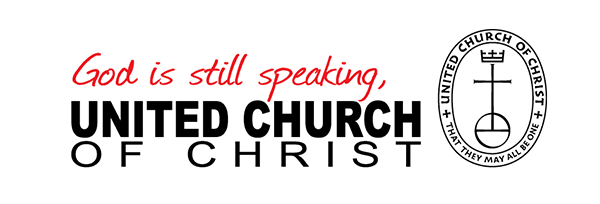
“Wendy’s has turned its back on successful efforts in Florida to protect workers’ basic human rights and has moved its supply chain to Mexico where human rights abuses are rampant…”
Joining the Presbyterian Church (U.S.A.) as well as T’ruah: The Rabbinic Call for Human Rights, the United Church of Christ has, once again, taken a stand alongside farmworkers and formally endorsed the Wendy’s boycott. In a sweeping resolution, the UCC, which represents over 1 million worshippers in the United States, affirmed the just cause of farmworkers fighting for dignity in the fields, and condemned Wendy’s for its stubborn refusal to support those efforts.
In announcing the endorsement, The Rev. John C. Dorhauer, General Minister and President of the UCC, and Rev. Dr. Traci D. Blackmon, Executive Minister, Justice & Witness Ministries, put out this simple but powerful statement:
“The United Church of Christ has a long history of standing with farm workers against the injustice and invisibility that often accompanies the labor that satiates our consumerism. Through its recent resolution, the United Church of Christ Board of Directors affirms this history.
Our comforts must not be provided at the expense of our neighbor’s discomfort.
For ten years the Coalition of Immokalee Workers has asked Wendy’s to join other industry partners, by participating in the Fair Food Program in partnership with tomato growers, farm workers, and buyers, to improve the lives of farm workers.
For 10 years the request has been simple and fair: a zero-tolerance policy for slavery and sexual harassment, an additional penny per pound of tomatoes picked, and a formal grievance policy to address worker concerns.
Ten years is long enough to simply ask a major corporation to do the right thing.”
The UCC’s unwavering commitment to justice for farmworkers extends back through Fair Food history all the way to 2001 and the launch of the Taco Bell Boycott. One of the CIW’s earliest allies and a legend in farmworker advocacy circles, Bert Perry of the National Farmworker Ministry, worked closely with Church Women United and local church leaders to bring a resolution to the 2001 General Synod of the UCC — and with its overwhelming passage, the resolution marked the very first boycott endorsement by a national religious  body for the fledgling Fair Food movement. From that moment forward, UCC church members sent postcards, hosted CIW members along weeks-long truth tours, and tirelessly demonstrated the faith community’s commitment to the urgent struggle for human rights for Florida tomato pickers.
body for the fledgling Fair Food movement. From that moment forward, UCC church members sent postcards, hosted CIW members along weeks-long truth tours, and tirelessly demonstrated the faith community’s commitment to the urgent struggle for human rights for Florida tomato pickers.
In the wake of the 2005 Taco Bell victory, UCC leadership released a truly beautiful statement which, today — with the Fair Food Program firmly rooted in the Florida tomato industry, and swiftly expanding to new crops and states — rings prophetic:
“We can be proud that the UCC was the first national denomination to endorse the boycott, and that many UCC congregations all over the country worked and prayed in support of this struggle for justice,” [UCC Minister Edith] Rasell said.
In July 2001, just three months after the boycott’s launch, the UCC’s General Synod, meeting in Kansas City, Mo., became the first denominational body to endorse the farm workers’ campaign against Taco Bell. In subsequent years, the UCC was joined by several religious groups including the Presbyterian Church (U.S.A.), the Christian Church (Disciples of Christ), the United Methodist Church and the National Council of Churches.
“We can also learn some important lessons,” Rasell said, noting that, in addition to Taco Bell, Yum Brands also owns Kentucky Fried Chicken, Pizza Hut, A&W and Long John Silvers. “It is a multi-billion dollar, multinational firm. It is the largest fast-food company in the world.”
“The vision of farm workers confronting Yum is a bit like David confronting Goliath,” she said. “But the success of this struggle illustrates that when committed, faithful people come together to work for justice, even in the face of powerful opposition, there may be nothing we cannot achieve. Our God of justice is a powerful God. Another world is possible.”
Now, twelve years later, a new world of real, enforceable respect for farmworkers’ human rights is not only possible, it is here to stay.

We have achieved great things in our struggle over the years — bringing about historic changes for farmworkers in Florida (and now along the East Coast), and in the process proving the unique effectiveness of a remarkable new model for the protection of human rights with almost limitless potential for low-wage workers at the bottom of corporate supply chains around the globe — but in many ways our journey has only just begun. The continued expansion of the Fair Food Program, and the adoption in other industries beyond agriculture of the Worker-driven Social Responsibility model, lie ahead on the long road before us.
But whether we look to the iconic story of David and Goliath, or to our own more recent, but equally unlikely, history of farmworkers and consumer allies winning agreement after agreement with 14 major food retail companies, there is not a sliver of doubt about how this latest chapter will end.
Today, once again, we are at the doorstep of another multi-billion dollar, multinational firm, another of the largest fast food companies in the world, accompanied by committed, faithful people, demanding justice. And tomorrow, once again, we will win.

